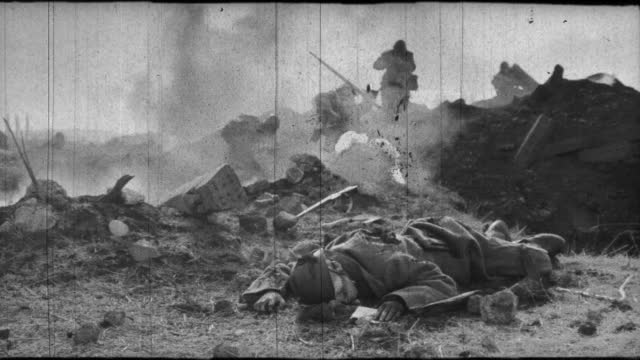Education
How The World War II Happened

World War II was a global conflict that engulfed much of the world from 1939 to 1945. The origins of this monumental conflict can be traced back to a complex web of factors, events, and ideologies that converged to ignite the deadliest war in human history. Here’s an in-depth exploration of the causes of World War II:
1. Treaty of Versailles and the aftermath of World War I: The harsh terms imposed on Germany by the Treaty of Versailles in 1919 sowed the seeds of resentment, economic hardship, and political instability in the defeated nation. The treaty’s punitive measures, including massive reparations and territorial losses, created a combustible environment that fueled German nationalism and militarism, setting the stage for future conflict.
2. Rise of totalitarian regimes: The interwar period saw the rise of totalitarian regimes in Germany, Italy, and Japan, each with expansionist ambitions and aggressive foreign policies. Adolf Hitler’s Nazi regime in Germany, Benito Mussolini’s fascist government in Italy, and the militaristic leadership in Japan sought to assert their dominance through territorial conquest and ideological supremacy.
3. Expansionist agendas and imperialism: With a vision of territorial expansion and the pursuit of hegemony, these regimes pursued aggressive foreign policies, seeking to establish dominance over neighboring regions and secure access to vital resources. Japan’s invasion of Manchuria in 1931, Italy’s conquest of Ethiopia in 1935, and Germany’s remilitarization of the Rhineland in 1936 were early indications of their expansionist designs.
4. Failure of appeasement and diplomacy: The policy of appeasement, pursued by Western powers in response to the expansionist ambitions of Germany and Italy, aimed to avoid conflict by conceding to their demands. However, this approach proved futile as it only emboldened aggressor nations, further fueling their ambitions and leading to an escalation of hostilities.
6. Failure of collective security: The ineffectiveness of collective security mechanisms, such as the League of Nations, in preventing aggression and ensuring international stability contributed to a climate of uncertainty and escalating tensions. The inability of the international community to confront aggressor nations collectively allowed the geopolitical landscape to become increasingly volatile, paving the way for further acts of aggression and territorial expansion.
7. Economic instability and global depression: The Great Depression of the 1930s had far-reaching economic repercussions, shaking the foundations of global stability and exacerbating socio-economic hardships. Widespread unemployment, poverty, and economic unrest provided fertile ground for the rise of extremist ideologies and militaristic solutions, fostering a climate ripe for the outbreak of conflict.
8. Nationalism, militarism, and propaganda: The propagation of nationalistic fervor, militaristic ideologies, and the relentless dissemination of propaganda by totalitarian regimes fueled a fervent and aggressive militarization, stirring up fervor for expansion, conquest, and domination.
9. Ideological clashes and racial discrimination: The rise of fascist and totalitarian ideologies, accompanied by racist doctrines and discrimination, led to the persecution of minority groups, including Jews, Roma, and other marginalized communities. This fervent bigotry and racial hatred sowed the seeds of genocidal policies that would later lead to the unfathomable atrocities of the Holocaust and other mass atrocities.
10. Chain reaction of alliances and treaties: The intricate network of alliances, pacts, and military treaties among nations contributed to the rapid escalation of conflict when hostilities erupted. With a domino effect of interventions and declarations of war, previously distant regional conflicts rapidly evolved into a global conflagration.
In conclusion, the causes of World War II are deeply intertwined with a confluence of historical, political, economic, and ideological factors that, when combined, created a powder keg of tensions and ambitions. The failure of diplomacy, the rise of totalitarian regimes, territorial expansion, economic instability, and the impact of the aftermath of World War I all played crucial roles in setting the stage for a conflict of unprecedented scale and devastation. Understanding the complex interplay of these multifaceted causes provides vital insights into the cataclysmic events that led to humanity’s greatest tragedy and underscores the imperative of fostering peace, cooperation, and understanding in our global community.
-

 Breaking News3 years ago
Breaking News3 years agoBREAKING: CBN Redesigns Naira Notes
-

 Breaking News2 years ago
Breaking News2 years agoBREAKING: Tinubu Considers Temporary Subsidy On Petrol
-

 Breaking News2 years ago
Breaking News2 years agoJUST IN: Gbajabiamila Dies In UK
-

 News3 years ago
News3 years agoDrama As Church Gives Certificate Of Virginity To Ladies After Testing Them (See Photos)
-

 Crime4 years ago
Crime4 years agoUproar As Student Teacher On Teaching Practice Impregnates 24 Girls, Headmistress, Four Female Teachers
-

 Breaking News10 months ago
Breaking News10 months agoJUST IN : Sacked Osun LG Chairman Killed Few Minutes After Returning To Office
-

 Breaking News2 years ago
Breaking News2 years agoBREAKING: Dangote Speaks As BUA Reduces Price Of Cement
-

 Crime3 years ago
Crime3 years agoJUST IN: Gunmen Storm Osogbo, Kill Man, Daughter Few Hours After His Wife Put To Bed (Photos)
